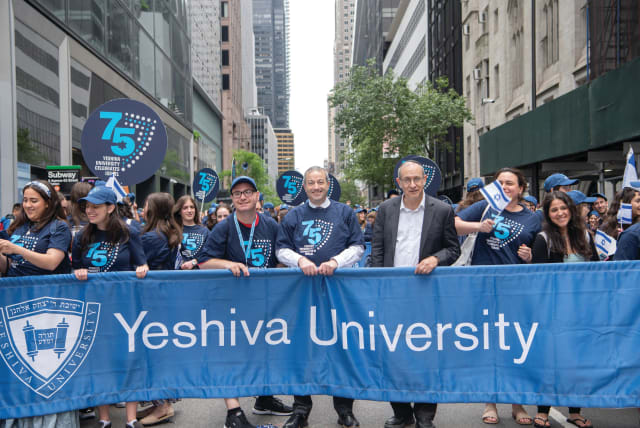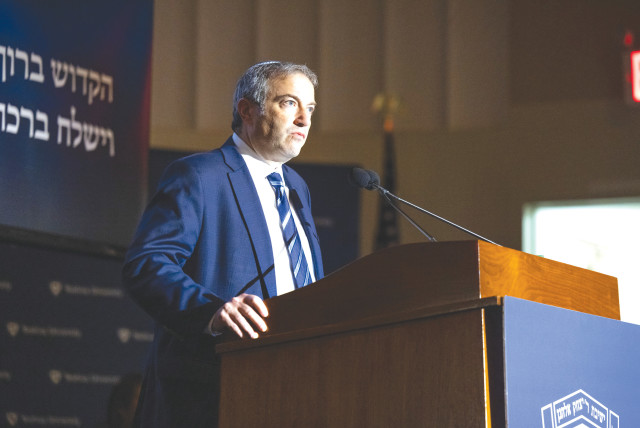'Jewish students are hiding who they are' as antisemitism surges

Yeshiva University president Rabbi Dr. Ari Berman on the surge of hate on US campuses.
‘Jewish students are hiding their mezuzahs. They’re debating whether they should take mezuzahs off their doors. They’re thinking very seriously about removing the status symbols that identify them as Jewish,” Rabbi Dr. Ari Berman, president of Yeshiva University, told The Jerusalem Post in a recent interview.
YU, a private Orthodox Jewish institution in New York City, offers a unique dual curriculum blending academic and Torah studies, catering mainly to the Modern Orthodox community but also attracting a diverse student body, including non-Jews, in various professional programs.
At the end of October, universities from across the United States and around the globe, totaling more than 100, banded together to express their solidarity with Israel in opposition to the actions of Hamas. The coalition boasted a rich diversity, encompassing public and private universities, faith-oriented institutions, and historically black colleges and universities.
Their collective statement, led by Berman, not only articulated support for Israel but also underscored their concerns for Palestinians who endured hardships under Hamas governance in Gaza. Furthermore, it signaled a commitment to uphold ethical standards.
“Indeed, it’s crucial to understand the breadth of this issue, and I can shed light on this through my initiative of drafting a letter that gained support from over 100 university presidents,” the rabbi explained. “This letter stood in solidarity with Israel against Hamas and led to the formation of a new group, Universities United Against Terrorism.
In my role, I’ve had the opportunity to speak with dozens of college presidents across the country, giving me a comprehensive view of what’s happening in colleges nationwide.
What is going on in colleges nationwide?
“My discussions with various campuses, spanning most states in the United States, have been enlightening, and I’ve gained numerous insights that I’m eager to share. Additionally, we frequently hear from concerned parents and students. Many reach out to us for guidance or are considering transferring to Yeshiva University.
These interactions are a testament to our position in the American Jewish community as a trusted resource and a haven for many.”
Regarding the surge in applications to Yeshiva University, Berman noted, “YU undergraduate was oversubscribed, last year. We had a waiting list that was longer than we’ve ever had before.”
This trend, as Berman explained, was indicative of Jewish students seeking safer and more welcoming academic environments due to the hostile atmosphere on other campuses.
“This year, the demand has further increased, with a 65% rise in students looking to join us this January. Understanding the urgency of the situation, we’ve expedited our process to assist those in difficult circumstances, ensuring no one is left behind.
“However, our goal at YU extends beyond just accommodating this surge in applications. We aim to foster a broader network of safety and support across various campuses. We recognize that not every Jewish student in America can physically attend Yeshiva University. Still, as the flagship Jewish university, we consider it our responsibility to safeguard their well-being.”
Berman emphasized the university’s broader mission. “My goal isn’t to absorb all these students into Yeshiva University, but actually to create the protections in the other campuses.” He articulated a vision of fostering safety and acceptance for Jewish students in various educational institutions.
Reflecting on his conversations with college presidents across the country, Berman highlighted, “I’ve spoken to dozens of college presidents throughout the country; I have my finger on the pulse of what’s happening in colleges.”Through these discussions, Berman gained insights into the challenges and fears faced by Jewish students nationwide.
He also touched on collaborative efforts with Jewish organizations, noting, “I’ve been in deep conversation with Hillel, with Chabad, and others. We’re all working together.”
Discussing the reactions of university presidents to the rising antisemitism, Berman expressed surprise: “College university presidents have said this is the most divisive issue on their campuses in recent history.” He pointed out the unique nature of this issue, which creates tension and division, unlike other social movements, which usually see a unified stand by the student body.
A critical aspect of Berman’s approach was advocating for moral clarity in education. He stated, “The fear of setting off the campus, which paralyzes the president, ironically in many cases might be enabling the very tension that you seek to avoid.”
YU sent 41 busloads of students, faculty, and staff to Washington, DC, to participate in the March for Israel rally a few weeks ago, canceling all undergraduate classes for the day to enable this.
“This is leadership at a time where rabbinic leadership is very needed,” he said. “When YU cancels classes, the entire yeshiva system knows that they can come and cancel their classes.”
BERMAN CONCLUDED by reflecting on the broader implications for the American Jewish community and the essential role of educational institutions in shaping a future that is safe and inclusive for all students. He reiterated his commitment to this cause. “We’re not going to be able to take all of the students in America. We need to make sure that there are places in the country that they can go to and go to safely.”
Berman asked to emphasize: “In America, our approach needs to shift from merely identifying those who have fallen short to recognizing and collaborating with allies. If this issue remains confined to a solely Jewish narrative, history has taught us that the outcome is unlikely to be favorable. Moreover, history also shows that while the Jewish community may be the current focus, such attention can rapidly shift to another group. This is not just a Jewish problem; it’s a societal issue within America.
“The encouraging aspect, as I’ve discovered through my conversations, is that there are many good people in the country and in higher education who are willing to speak with clarity and who genuinely care about truth and goodness, not just about this issue.
“While the media rightly focuses on the problems, my primary goal is to assemble a coalition of these ‘angels’ – the partners with whom we can work, both now and in the future, to address these challenges effectively.”
Jerusalem Post Store
`; document.getElementById("linkPremium").innerHTML = cont; var divWithLink = document.getElementById("premium-link"); if (divWithLink !== null && divWithLink !== 'undefined') { divWithLink.style.border = "solid 1px #cb0f3e"; divWithLink.style.textAlign = "center"; divWithLink.style.marginBottom = "15px"; divWithLink.style.marginTop = "15px"; divWithLink.style.width = "100%"; divWithLink.style.backgroundColor = "#122952"; divWithLink.style.color = "#ffffff"; divWithLink.style.lineHeight = "1.5"; } } (function (v, i) { });

